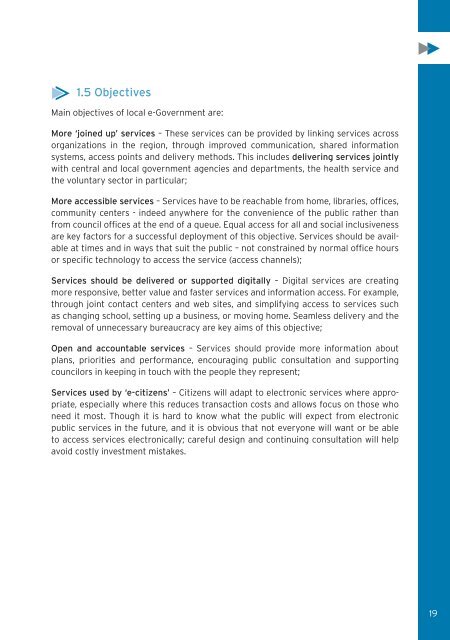for Local Governments
for Local Governments
for Local Governments
Create successful ePaper yourself
Turn your PDF publications into a flip-book with our unique Google optimized e-Paper software.
1.5 Objectives<br />
Main objectives of local e-Government are:<br />
More ‘joined up’ services – These services can be provided by linking services across<br />
organizations in the region, through improved communication, shared in<strong>for</strong>mation<br />
systems, access points and delivery methods. This includes delivering services jointly<br />
with central and local government agencies and departments, the health service and<br />
the voluntary sector in particular;<br />
More accessible services – Services have to be reachable from home, libraries, offices,<br />
community centers - indeed anywhere <strong>for</strong> the convenience of the public rather than<br />
from council offices at the end of a queue. Equal access <strong>for</strong> all and social inclusiveness<br />
are key factors <strong>for</strong> a successful deployment of this objective. Services should be available<br />
at times and in ways that suit the public – not constrained by normal office hours<br />
or specific technology to access the service (access channels);<br />
Services should be delivered or supported digitally – Digital services are creating<br />
more responsive, better value and faster services and in<strong>for</strong>mation access. For example,<br />
through joint contact centers and web sites, and simplifying access to services such<br />
as changing school, setting up a business, or moving home. Seamless delivery and the<br />
removal of unnecessary bureaucracy are key aims of this objective;<br />
Open and accountable services – Services should provide more in<strong>for</strong>mation about<br />
plans, priorities and per<strong>for</strong>mance, encouraging public consultation and supporting<br />
councilors in keeping in touch with the people they represent;<br />
Services used by ‘e-citizens’ – Citizens will adapt to electronic services where appropriate,<br />
especially where this reduces transaction costs and allows focus on those who<br />
need it most. Though it is hard to know what the public will expect from electronic<br />
public services in the future, and it is obvious that not everyone will want or be able<br />
to access services electronically; careful design and continuing consultation will help<br />
avoid costly investment mistakes.<br />
19

















